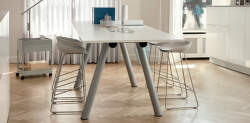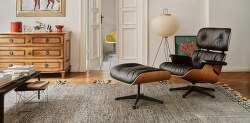1872
Fritz Hansen founded the business in the small town of Nakskov in the south of Denmark in 1872 yet a few years later he moved the company, then called Fritz Hansen & Co, to the centre of Copenhagen. And the design of the "office chair" emerged as one of the first chairs with a plywood backrest.
There was a lot going on until the end of the nineteenth century. A sawmill was established in Allerød, where the company's headquarters has been situated till today. The founder's 25-year-old son, Christian E. Hansen, also took the chair of director's office. With the same passion and vision as his father, he established collaborations with leading architects and won many prestigious projects: we can name the production of furniture for the Danish Parliament or Copenhagen City Hall for all of them.

Fritz Hansen, founder of

Fritz Hansen catalogue, 1890
1900
The beginning of the twentieth century was shrouded in mourning. In 1902, the founder of the company, Fritz Hansen, died. In the same year, the famous Arne Jacobsen was born, whose later contribution is probably the most significant in the context of the company.
New technologies and big names
Just as significant as the steam bending technique that gave the production of the 1910s and 1920s a literally new dimension. Not only from a Czech perspective, the groundbreaking discovery was made by Thonet, which entrusted Fritz Hansen with the exclusive rights to produce their designs on the Scandinavian market.

With the next decades, a fresh wind came to the company and to the trends in architecture and design. In 1932, the company was strengthened by new family members: Søren Christian and Paul Fritz Hansen. Søren was responsible for the development of new products and Paul for the production process, both of whom, in addition to new ideas, also brought in elements of functionalism and the closely related bent steel.
It is probably not surprising that with new memners in the company, the new aesthetic direction and the new material, new collaborations naturally came as well. In addition to the Lassen brothers or J. Wegner, Poul Kjærholm and the duo Hvidt&Mølgaard, it was also Arne Jacobsen with his Bellevue project, which ignited a lifelong successful partnership. And, of course, other major projects emerged, such as furnishing a well-known architectural piece – Copenhagen's Grundtvigs church – with furniture.

Chair production Series 7, 1953, Allerød

Chairs by Arne Jacobsen
The fifties and sixties were marked by success, as most of Arne Jacobsen's famous designs were made during this period. They were kicked off by the Ant chair in 1952, followed by the Series 7 chairs, the Grand Prix and the entire SAS Royal Hotel project, which gave rise to the Egg and Swan chairs.
In the 1970s, Verner Panton joined the ranks of the big names with his System 1-2-3 furniture and later the very bold Wire Cone Chair.

Egg chair production, 1963

SAS Royal, Drop Chair

Verner Panton furniture, 1970s
2000
Into the new millennium with a new name. Cecile Manz, Jaime Hayon, or even entire brands like Lightyears and Skagerak came under the flagship bearing the Republic of Fritz Hansen. Drawing from the founder's history and legacy, the brand with the again shortened name is taking a new course towards new beginnings by combining contemporary demands with iconic design.


2022
What a spectacular anniversary. We wish the Fritz Hansen brand, which has proven to be a true matador of Scandinavian tradition and timelessness, another wonderful anniversaries and the longest possible pressence in shaping the furniture design.


















